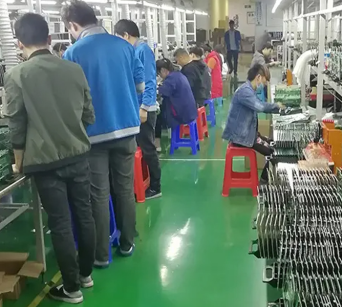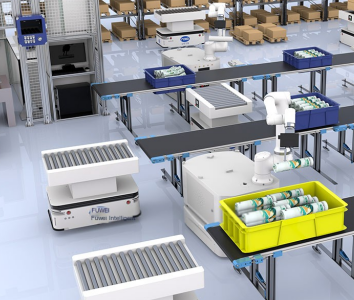QR Code

About Us
Products
Contact Us

Phone

E-mail

Address
No. 22, Hongyuan Road, Guangzhou, Guangdong Province, China
Warehouse management is an important component of smart logistics. By introducing automated and intelligent warehouse management systems, 3C electronic enterprises can achieve precise inventory management, fast sorting, and efficient distribution. This not only reduces inventory costs, but also greatly improves operational efficiency and market response speed.
Traditional warehouse management relies on manual operations and paper document records, which have many limitations and shortcomings. For example, manual operation is inefficient and prone to errors; Paper documents are prone to damage or loss, which is not conducive to data management and traceability; Lack of real-time monitoring and warning mechanisms, making it difficult to respond to unexpected situations. These limitations and deficiencies constrain the efficiency and accuracy of warehouse management, affecting the smoothness of the entire logistics process.

The advantages of smart warehouse management
Smart warehouse management is a management model that utilizes advanced technology to achieve intelligent and automated warehousing. Compared to traditional warehouse management, smart warehouse management has the following advantages:
Automation and Intelligence: By introducing automation equipment and intelligent technologies such as unmanned forklifts, automated shelves, intelligent sensors, etc., the automation and intelligence of warehousing operations can be achieved. This not only improves homework efficiency, reduces manual operations, but also lowers error rates.
Data driven: Smart warehouse management relies on real-time data collection and analysis to achieve warehouse optimization through data-driven approaches. This enables enterprises to have real-time access to inventory status, goods location, and other information, providing strong support for decision-making.
Real time monitoring and warning: The intelligent warehouse management system can achieve real-time monitoring of the environment, cargo status, and other information in the warehouse, timely detect abnormal situations, and issue warnings. This helps companies quickly respond to unexpected situations and reduce losses.

Practical Cases of Smart Warehouse Management
Amazon's Warehouse Management: Amazon utilizes advanced warehouse management systems and technologies to achieve rapid retrieval, automated storage, and delivery of goods. By adopting automation equipment such as robots and autonomous vehicles, the efficiency and accuracy of warehousing operations have been significantly improved.
JD's intelligent warehouse: JD has introduced an intelligent warehouse management system to achieve real-time monitoring of inventory, automatic replenishment, and rapid outbound functions. Meanwhile, utilizing big data analysis technology to predict sales data, optimize inventory structure, and reduce inventory costs.
SF Express's integrated warehousing and distribution: SF Express has established an integrated warehousing and distribution system to achieve full monitoring and scheduling of goods from storage to outbound. Utilizing IoT technology and big data analysis to optimize delivery routes in real-time, improve delivery efficiency and service quality.
In the future, smart warehouse management will pay more attention to personalized needs and user experience, achieving more refined services. Meanwhile, environmental protection and sustainable development will become important directions for the development of smart logistics, promoting enterprises to achieve green logistics.




No. 22, Hongyuan Road, Guangzhou, Guangdong Province, China
Copyright © 2024 Guangzhou Fuwei Electronic Technology Co., Ltd. All Rights Reserved.
Links | Sitemap | RSS | XML | Privacy Policy |

